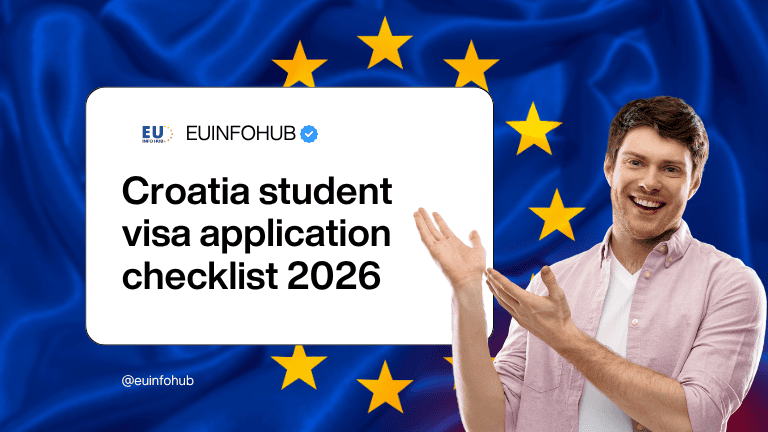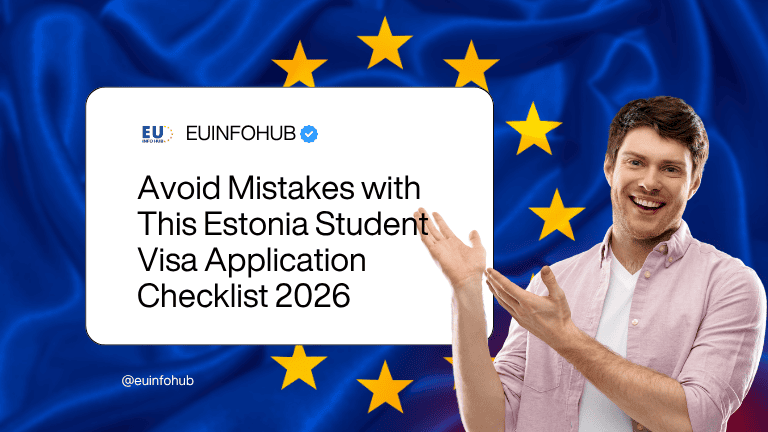When you’re planning to study in Portugal in 2026, having a rock-solid Portugal student visa application checklist 2026 can save you time, stress, and last-minute panics. Portugal ranks as the seventh safest country in the world, boasting top-tier universities, affordable living, and an outstanding higher education system (Global Citizen Solutions). So let’s break down every step you’ll need—from picking the right visa type to registering with local authorities once you arrive.
By the end of this ultimate guide, you’ll have a clear list of must-have documents, key deadlines, insider tips, and links to deeper resources like our step by step guide for student permit. Ready to get started?
Understand visa categories
Before you gather documents, you’ll need to know which visa fits your study plan.
Short-stay vs long-stay visas
- Short-stay (Type C) covers programs under 90 days, like summer courses or campus visits.
- Long-stay (Type D) applies to semester-long or degree programs over 90 days.
Schengen vs national visas
Portugal issues both Schengen visas for short trips and national visas for long-term study. Each comes with its own cost and processing time.
Temporary stay visas
Good for under one year. Valid for multiple entries and your first landing in Portugal.
Residence visas
Issued for up to four months, allowing two entries. You’ll use this to get your residence permit once you’re in Portugal.
Confirm application timing
Missing deadlines is one of the fastest ways to delay your studies.
When to apply
- Submit your application between 180 and 75 days before your program start (API Abroad).
- Aim for at least three months ahead—processing can take six to 15 weeks on average (API Abroad).
Consulate jurisdictions
Portuguese consulates in the U.S. (New York, Washington DC, San Francisco, etc) each serve specific states. Double-check yours so you apply at the right place.
Appointment scheduling
You must book an in-person slot at a VFS visa application centre. No expedited service is available, so lock in your date as soon as possible.
Prepare core documents
This is the heart of your checklist—get these right and you’ll clear most hurdles.
Valid passport
Ensure your passport expires at least three months after your planned departure from Portugal.
Completed application form
Fill out the official Schengen/National visa form neatly. Sign it exactly as your passport name.
Recent photographs
Two color photos, 35x45mm, on a light background. Follow biometric standards.
Proof of admission
Include your acceptance letter or enrolment confirmation from the Portuguese institution.
Gather financial proof
You’ll need to show you can cover living costs while in Portugal.
Minimum bank balance
You must demonstrate €6000 per month of stay (Global Citizen Solutions). For a one-year program, that’s around €7200 to €9000, depending on your exact months.
Scholarship statements
If you’ve secured funding, provide official award letters with amounts, durations, and payment schedules.
Affidavit of support
For family sponsorship, include a signed letter from your sponsor, plus their bank statements and ID copies.
Secure health coverage
Healthcare’s important—never leave it as an afterthought.
Medical insurance policy
Obtain a policy valid in Portugal for the duration of your stay. It must cover emergencies, repatriation, and at least €30,000 in medical costs.
Coverage requirements
Check if your EU/EEA plan extends to Portugal. If not, buy private international student insurance.
Obtain background checks
A clean criminal record is part of the deal—and there’s a new twist for 2026.
FBI background report
As of May 2025, you need an apostilled FBI check (N.U.in Portugal Visa Information). Plan five weeks or more, including apostille processing.
Apostille certificate
Get your FBI report apostilled by the State Secretary’s office. Some consulates insist on unopened sealed documents.
Compile supporting materials
These extras tie your application together and answer consular questions before they ask.
Accommodation proof
Show a rental contract, dorm confirmation, or letter from your host family.
Travel itinerary
Submit round-trip flight reservations or a detailed travel plan until you secure full bookings.
Language proficiency
No universal minimum if your course is in English. But for Portuguese-taught programs, include test results or a certificate.
Submit your application
At this stage, you’ll hand in everything you’ve collected—so double-check your folder.
VFS Global submission steps
- Book and attend your VFS appointment with all originals and copies.
- Pay the non-refundable fee (€90 for long-stay, €75 for short-stay) in local currency (Global Citizen Solutions).
- Provide biometrics and have your documents scanned.
Consular interview tips
- Dress smart casual and be on time.
- Be ready to explain your study plan in simple terms.
- Keep answers brief and honest.
Track application status
Retain the return envelope tracking number. Check updates online or call your VFS centre if it’s past the estimated processing window.
Plan arrival formalities
Once your visa arrives, there are a few more steps before you can hit the books.
Residence permit application
Within four months of arrival, apply for your Autorização de Residência at AIMA (formerly SEF).
Register with local authorities
Some municipalities require student registration. It’s quick—usually just an ID check.
Open a Portuguese bank account
You’ll need this for rent, utilities, and daily expenses. Bring your residence card, passport, and proof of address.
Avoid common mistakes
Save time by steering clear of these traps (and see our common mistakes on student visa applications for more).
- Missing the 75-day latest submission cutoff
- Submitting expired or damaged photos
- Forgetting the apostilled FBI check
- Showing insufficient funds on bank statements
- Applying at the wrong consular jurisdiction
Compare other countries
If you’re still weighing options across Europe, each nation has its own list—check out:
- General checklist: student visa application checklist
- Austria: austria student visa application checklist 2026
- Belgium: belgium student visa application checklist 2026
- Bulgaria: bulgaria student visa application checklist 2026
- Croatia: croatia student visa application checklist 2026
- Cyprus: cyprus student visa application checklist 2026
- Czech Republic: czech republic student visa application checklist 2026
- Denmark: denmark student visa application checklist 2026
- Estonia: estonia student visa application checklist 2026
- Finland: finland student visa application checklist 2026
- France: france student visa application checklist 2026
- Germany: germany student visa application checklist 2026
- Greece: greece student visa application checklist 2026
- Hungary: hungary student visa application checklist 2026
- Ireland: ireland student visa application checklist 2026
- Italy: italy student visa application checklist 2026
- Latvia: latvia student visa application checklist 2026
- Lithuania: lithuania student visa application checklist 2026
- Luxembourg: luxembourg student visa application checklist 2026
- Malta: malta student visa application checklist 2026
- Netherlands: netherlands student visa application checklist 2026
- Poland: poland student visa application checklist 2026
- Romania: romania student visa application checklist 2026
- Slovakia: slovakia student visa application checklist 2026
- Slovenia: slovenia student visa application checklist 2026
- Spain: spain student visa application checklist 2026
- Sweden: sweden student visa application checklist 2026
Review key takeaways
- Decide on the right visa type (Type C vs Type D) early
- Apply 180–75 days before your program and at the correct consulate
- Gather your passport, photos, enrolment proof, financial statements, and apostilled FBI check
- Use VFS Global for submissions and track with your envelope number
- Register for your residence permit within four months of arrival
With this checklist in hand, you’re set to tackle your Portugal student visa like a pro. Ready to take the next step? Share your questions below or dive deeper into our step by step guide for student permit. Good luck, and boa viagem!
















1 thought on “The Essential Portugal Student Visa Application Checklist for 2026”